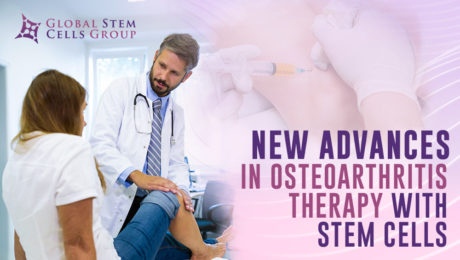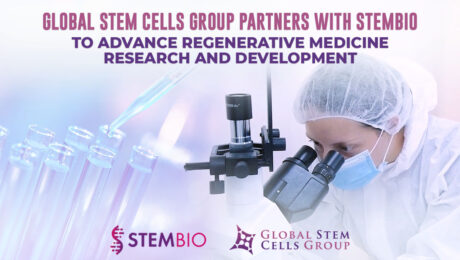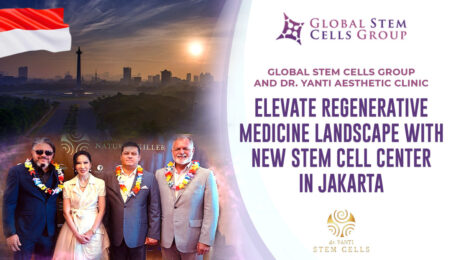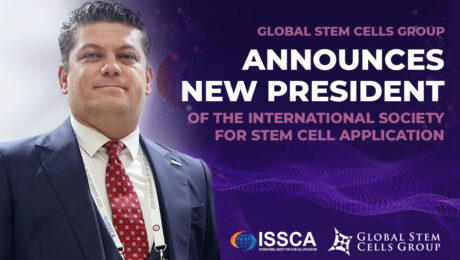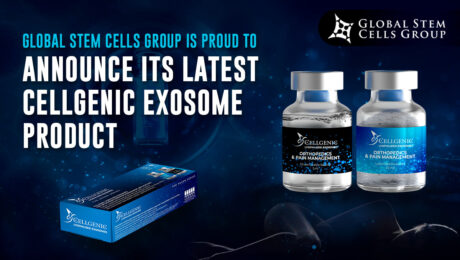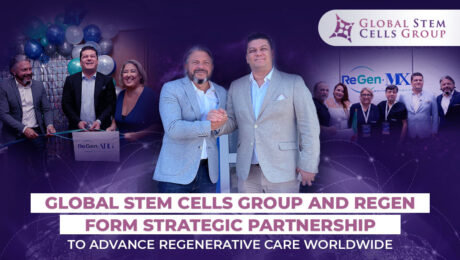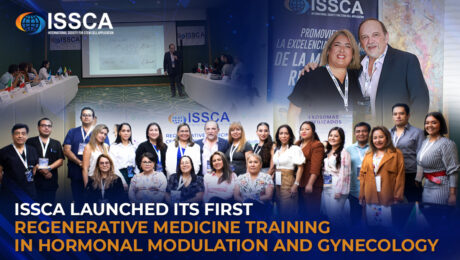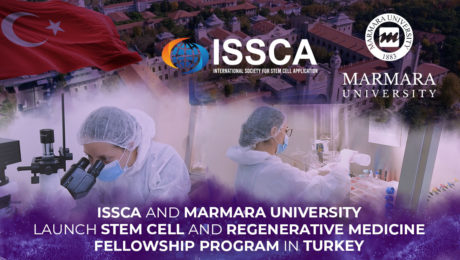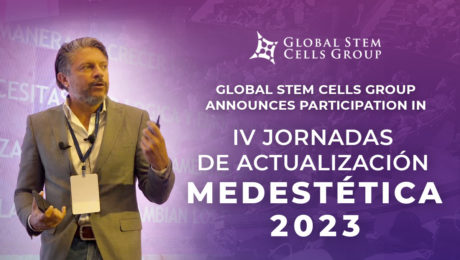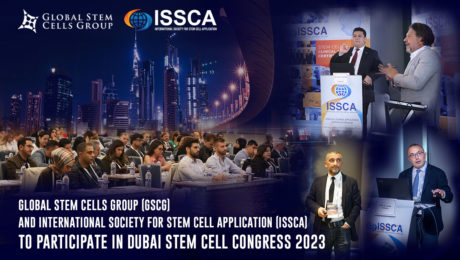New advances in osteoarthritis therapy with stem cells
Osteoarthritis is a rheumatic pathology that damages the articular cartilage. By joining two bones through the joint capsule, the joints are able to move, providing us with functional autonomy. An inner fluid called synovial fluid is usually found within joints, which is produced by the synovial membrane. Articular cartilage covers the ends of the bones that form the joint. As a result of damage to this articular cartilage, pain, stiffness, and functional impairment occur. Osteoarthritis is the most common joint disorder, usually beginning between the ages of 40 and 50, affecting to some degree almost everyone over the age of 80. Typically, osteoarthritis affects the spine, shoulders, fingers, hips, knees, and toe joints.
Stem cell therapies have the potential to treat a broad spectrum of diseases. Whether it’s rhizarthrosis, diabetes, neurodegenerative diseases, spinal cord injuries, or heart disease. By utilizing stem cells, regenerative medicine is capable of repairing tissues in affected areas. The main difference between lipo gem therapy and other treatments for osteoarthritis is that lipogem therapy regenerates cartilage, avoids surgery and its sequelae, and improves the quality of life for patients.
The potential for medical treatments with stem cells and their by-products is currently very high. In the field of sports medicine and traumatology, one of the most outstanding advances has been made for the first time in decades recently: Spanish scientists have achieved a degree of tendon regeneration in 100% of injured patients, resulting in a decrease in pain and a return to sport within two months, and just six months after the trial was completed.
A research performed by the Institute of Regenerative Tissue Therapy (ITRT), published by the prestigious American Journal of Sports Medicine. Demonstrates how this therapy regenerates chronic lesions in the patellar tendon and opens up a new therapeutic option for this tissue, which was considered impossible to regenerate.
In most patients, fat tissue can be harvested minimally invasively (under local or general anesthesia), providing a highly viable MSC population regardless of donor age. Similar to MSCs derived from other tissues, adipose tissue-derived MSCs have regenerative potential. As osteoarthritis is a very common joint disease, and knee osteoarthritis is the most common form, it is necessary to review scientific literature on osteoarthritis treatments with stem cells, like lipogems.
Lipogems Therapy
Lipogems therapy is a novel procedure that enhances the body’s natural ability to heal itself through the innovative power of science and biotechnology. The Lipogems method involves injecting mesenchymal stem cells into the joints. Adipose-derived mesenchymal stem cells have enormous regenerative potential. They also have a regenerative capacity independent of their age. Even older individuals can benefit from this procedure.
Injection of mesenchymal stem cells into the knee, particularly in the early stages of osteoarthritis, can stop the process of inflammation and degeneration, especially in the less advanced stages of the disease. In addition to preventing progressive physical deterioration of the articular cartilage, this treatment contributes significantly to a patient’s well-being and prevents the installation of knee prostheses.
Patellar tendinopathy, physiotherapeutic treatment and stem cell therapy
Injuries to the patellar tendon that connects the kneecap to the tibia are known as patellar tendinopathy or patellar tendinitis. The patellar tendon works with the muscles in the front of the thigh to extend the knee so you can kick, run and jump. Athletes who perform frequent jumping in their sports, such as basketball and volleyball, are most likely to suffer from patellar tendonitis. However, people who don’t engage in jumping sports may develop patellar tendonitis. Patients with patellar tendinitis usually begin treatment with physical therapy to stretch and strengthen their knee muscles.
Strength training with eccentric resistance is one of the most common treatments for tendinopathies. Alternatively, it has been demonstrated that bone marrow-derived mesenchymal stem cells (MSCs) can regenerate injured patellar tendons. Within six months of treatment, it has been observed that the structure of this tissue – which is always difficult to treat – is restored, reaching a regeneration of 40% in all injured persons, with a gradual improvement that eventually becomes complete.
It has been found that traditional management methods, including isometric or eccentric exercises, shock wave therapy, and even surgery, are not effective. As part of a rehabilitation program in chronic patellar tendinopathy, autologous expanded bone marrow mesenchymal stem cells (BM-MSC) or leukocyte-poor platelet-rich plasma (Lp-PRP) may be effective in reducing pain and improving activity levels. Traditional management, which includes isometric or eccentric exercises, shock wave therapy, and even surgery, has limited success. A combination of autologous expanded bone marrow mesenchymal stem cells (BM-MSCs) and leukocyte-poor platelet-rich plasma (Lp-PRP) and rehabilitation may reduce pain and improve activity levels in active participants with chronic patellar tendinopathy.
To learn more about stem cells, cellular therapies and keep up to date with all the information about regenerative medicine and its advances, sign up for our international certification in regenerative medicine at www.issca.us
- Published in Corporate News / Blog
Global Stem Cells Group Partners with StemBio to Advance Regenerative Medicine Research and Development
Miami, Florida— Global Stem Cells Group, a leader in regenerative medicine, is thrilled to announce a strategic partnership with StemBio, a renowned leader in the regenerative medicine landscape in Turkey. This partnership aims to propel research and development, conduct clinical trials, and create new products and protocols for the advancement of regenerative medicine.
StemBio, a trailblazer in Turkey, possesses all the necessary licenses and state-of-the-art infrastructure for regenerative medicine, including Bone Marrow Derived MSC, Adipose Derived MSC, Umbilical cord, placenta, Wharton jelly Derived MSC, Synovial Derived MSC, and more. We believe this diverse range of resources demonstrates StemBio’s commitment to excellence, making them one of the foremost facilities for regenerative medicine in Turkey.
This collaboration brings together two powerhouses in the regenerative medicine arena, aiming to break new ground in the research, development, and application of regenerative therapies. We believe the collective expertise and resources of StemBio and Global Stem Cells Group are set to drive innovation and advancements in regenerative care, benefiting patients worldwide.
“We are excited to partner with StemBio and leverage their expertise in regenerative medicine. This partnership should accelerate our mission to provide cutting-edge regenerative solutions to a global audience,” said Benito Novas, head of relationships at Global Stem Cells Group.
We believe the partnership between StemBio and Global Stem Cells Group signifies a significant milestone in the regenerative medicine field. As they combine their strengths and knowledge, they are committed to pushing the boundaries of what is possible in regenerative care and making a lasting impact on patients’ lives.
About Global Stem Cells Group:
The Global Stem Cell Group is a family of several companies focused on stem cell medicine and research. The company uses its network to bring leadership in regenerative medicine training, research, and patient applications.
GSCG’s mission is to allow physicians to present the benefits of stem cell medicine to patients worldwide. The company also partners with policymakers, educators, and regulators to promote regenerative medicine.
Global Stem Cells Group is a publicly traded company operating under the symbol MSSV. https://finance.yahoo.com/quote/mssv/
To learn more about Global Stem Cells Group, Inc.’s companies visit our website www.stemcellsgroup.com or call +1 305 560 5331
About StemBio:
StemBio is a renowned regenerative medicine facility in Turkey, equipped with cutting-edge infrastructure and a commitment to excellence. Holding the necessary licenses for cord blood and tissue banking, as well as advanced engineering solutions, StemBio is a leader in the regenerative medicine landscape.
Safe Harbor Statement: Statements in this news release may be “forward-looking statements”. Forward-looking statements include, but are not limited to, statements that express our intentions, beliefs, expectations, strategies, predictions, or any other information relating to our future activities or other future events or conditions. These statements are based on current expectations, estimates, and projections about our business based partly on assumptions made by management. These statements are not guarantees of future performance and involve risks, uncertainties, and assumptions that are difficult to predict. Therefore, actual outcomes and results may and are likely to differ materially from what is expressed or forecasted in forward-looking statements due to numerous factors. Any forward-looking statements speak only as of the date of this news release, and The Global Stem Cells Group undertakes no obligation to update any forward-looking statement to reflect events or circumstances after the date of this news release. This press release does not constitute a public offer of any securities for sale. Any securities offered privately will not be or have not been registered under the Act and may not be offered or sold in the United States absent registration or an applicable exemption from registration requirements.
- Published in Press Releases
Global Stem Cells Group (GSCG) and Dr. Yanti Aesthetic Clinic Elevate Regenerative Medicine Landscape with New Stem Cell Center in Jakarta
Miami, Florida – Global Stem Cells Group (GSCG) is thrilled to announce the grand opening of its latest state-of-the-art Stem Cell Center, located in Jakarta, Indonesia. This momentous occasion marks a significant stride forward in the field of regenerative medicine and showcases GSCG’s commitment to providing innovative healthcare solutions worldwide.
In a groundbreaking partnership with the esteemed Dr. Yanti Aesthetic Clinic, GSCG introduces its third Stem Cell Center in Indonesia, complementing existing facilities in Surabaya and Bandung. Further underscoring their dedication to advancing medical research, GSCG also anticipates the unveiling of a fourth location in Bali in the near future.
The launch of the Stem Cell Center in Jakarta serves as a beacon of innovation, the International Society for Stem Cell Application (ISSCA), GSCG’s educational division, conducted a groundbreaking training session alongside Dr. Alan Gaveck. This session spotlighted the transformational potential of NK cell therapies in treating Cancer and Anti-aging concerns, further cementing GSCG’s pioneering influence.
A distinctive feature of this collaboration is the authorization granted to Dr. Yanti Aesthetic Clinic to leverage GSCG’s brand, technologies, products, and treatment protocols. Operating as a franchise, the center proudly carries the brand, adhering to meticulous organizational guidelines, while being owned and operated by Dr. Yanti Aesthetic Clinic. This symbiotic arrangement seamlessly merges shared expertise with individual ownership, fostering a harmonious blend of vision and innovation.
Beyond its role as a clinical hub, the newly inaugurated Stem Cell Center will also serve as a focal point for ISSCA’s training initiatives in Asia. In addition to the pioneering NK cell therapy training conducted at the clinic, the center will facilitate educational programs to empower medical professionals across the continent with cutting-edge insights and advancements in regenerative medicine.
Benito Novas, an esteemed figure in the realm of regenerative medicine and the head of Public Relations for GSCG and ISSCA, shared his insights during the inaugural event, stating, “Global Stem Cells Group is dedicated to democratizing regenerative medicine access on a global scale. We encourage physicians to embrace the clinical and aesthetic applications of stem cell therapy, enabling patients around the world to experience the transformative benefits of regenerative treatments.”
Reflecting on the journey that led to this momentous occasion, Novas continued, “Dr. Yanti and I met in Brussels back in 2018, when this ambitious endeavor was but a vision. Today, as we witness the fruition of that vision, I express my profound gratitude for the privilege of collaborating with Dr. Yanti Aesthetic Clinic in ushering in the future of regenerative medicine.”
Dr. Yanti Kushmiran, Director of the DR. Yanti Aesthetic Clinic, echoed these sentiments, stating, “Our partnership with GSCG, a trailblazer with over a decade of pioneering work, resonates deeply with our commitment to excellence. The establishment of our third Stem Cell Center in Indonesia under the esteemed Global Stem Cells Group brand strengthens our ability to provide enhanced services to our patients, ushering in a new era of regenerative healthcare.”
With the inauguration of the Stem Cell Center in Jakarta, GSCG and Dr. Yanti Aesthetic Clinic take a significant stride towards advancing regenerative medicine’s frontiers. This landmark collaboration is poised to shape the future of medical care, leveraging cutting-edge technologies and expertise to benefit patients across the Asian continent and beyond.
About Dr. Yanti Aesthetic Clinic:
Dr. Yanti Aesthetic Clinic is a revered healthcare institution renowned for its state-of-the-art aesthetic and regenerative treatments. With an unwavering dedication to excellence and a forward-thinking approach, Dr. Yanti Aesthetic Clinic is poised to shape the future of regenerative medicine in Indonesia and beyond.
About the International Society for Stem Cell Application (ISSCA):
The International Society for Stem Cell Application (ISSCA) serves as the educational arm of Global Stem Cells Group (GSCG), dedicated to promoting knowledge and expertise in stem cell therapy and regenerative medicine. ISSCA empowers medical professionals across the globe with essential insights and advancements in the field.
About Global Stem Cell Group
The Global Stem Cell Group is a family of several companies focused on stem cell medicine and research. The company uses its network to bring leadership in regenerative medicine training, research, and patient applications.
GSCG’s mission is to allow physicians to present the benefits of stem cell medicine to patients worldwide. The company also partners with policymakers, educators, and regulators to promote regenerative medicine.
Global Stem Cells Group is a publicly traded company operating under the symbol MSSV. https://finance.yahoo.com/quote/mssv/
To learn more about Global Stem Cells Group, Inc.’s companies visit our website www.stemcellsgroup.com or call +1 305 560 5331
Safe Harbor Statement: Statements in this news release may be “forward-looking statements”. Forward-looking statements include, but are not limited to, statements that express our intentions, beliefs, expectations, strategies, predictions, or any other information relating to our future activities or other future events or conditions. These statements are based on current expectations, estimates, and projections about our business based partly on assumptions made by management. These statements are not guarantees of future performance and involve risks, uncertainties, and assumptions that are difficult to predict. Therefore, actual outcomes and results may and are likely to differ materially from what is expressed or forecasted in forward-looking statements due to numerous factors. Any forward-looking statements speak only as of the date of this news release, and The Global Stem Cells Group undertakes no obligation to update any forward-looking statement to reflect events or circumstances after the date of this news release. This press release does not constitute a public offer of any securities for sale. Any securities offered privately will not be or have not been registered under the Act and may not be offered or sold in the United States absent registration or an applicable exemption from registration requirements.
- Published in Press Releases
Global Stem Cells Group Announces New President of the International Society for Stem Cell Application (ISSCA)
Miami, Florida – Global Stem Cells Group, a leading organization in the field of regenerative medicine, is pleased to announce the appointment of Dr. Salih Yildirim as the new President of the International Society for Stem Cell Application (ISSCA), a division of Global Stem Cells Group. Dr. Yildirim previously held the position of Director of Overseas Operations at ISSCA.
Dr. Salih Yildirim brings a wealth of experience and expertise to his new role as President of ISSCA. Having previously served as the Director of Overseas Operations, Dr. Yildirim has demonstrated his exceptional leadership skills and strategic vision throughout his career. He has played a vital role in expanding ISSCA’s international presence and fostering collaborations with stakeholders worldwide.
In a statement regarding the appointment, Dr. Daeyong Kim, the former President of ISSCA, expressed his confidence in Dr. Yildirim’s ability to lead the organization. Dr. Kim stated, “I think you are the best leader and the most prepared to be the President of ISSCA. Therefore, I think you should be the head of ISSCA.” Dr. Kim will now transition to other support functions within ISSCA.
Benito Novas, head of Public Relations for ISSCA, expressed his admiration for Dr. Salih Yildirim’s professional qualities. Novas said, “I have known and worked with Dr. Salih for more than 10 years, and I am honored to have him as President within the company. During these years, he has proven to be an exceptional leader with a great vision for ISSCA.”
ISSCA’s objectives under the leadership of Dr. Salih Yildirim will include advancing the understanding and application of stem cell therapies, promoting scientific research and collaboration among professionals in the field, and advocating for the ethical and responsible use of regenerative medicine worldwide. Dr. Yildirim’s extensive experience in business development, international relations, and regenerative medicine will undoubtedly contribute to the achievement of these objectives.
About Dr. Salih Yildirim:
Dr. Salih Yildirim holds a bachelor’s and master’s degrees in business administration from Cleveland State University (United States) and a Ph.D. in health management from the University of Health Sciences. He has held various key positions throughout his career, including Director of Overseas Operations at ISSCA. Dr. Yildirim is currently the General Manager of BioTrend Medical International, a biotechnology firm specializing in genetics, molecular biology, and stem cell technologies. He also serves as the chief executive officer of ReGen.IC Clinic, specializing in regenerative medicine and stem cell applications. Additionally, he is a member of the International Society for Stem Cell Application’s Board of Directors and the Global Stem Cell Group’s Board of Directors and International Operations Manager. Dr. Yildirim is also a member of Istanbul Atlas University’s Board of Directors. He is married and a proud father.
About ISSCA
The International Society for Stem Cell Application (ISSCA) is a multidisciplinary community of scientists and physicians who aspire to treat diseases and lessen human suffering through advances in science, technology, and regenerative medicine.
ISSCA updates its members on advances in stem cell research, MSC, exosomes, and regenerative medicine
The ISSCA’s vision is to take a leadership position in promoting excellence and setting standards in the regenerative medicine fields of publication, research, education, training, and certification.
The international community provides a platform for practitioners to interact with scientists and build medical networks necessary for marketing.
As a medical specialty, regenerative medicine standards and certifications are essential, which is why ISSCA offers certification training in cities worldwide. The goal is to encourage more physicians to practice regenerative medicine and make it available to patients nationally and internationally. Incorporated under the Republic of Korea as a non-profit company, the ISSCA is focused on fostering excellence and standards in regenerative medicine.
About Global Stem Cells Group
Global Stem Cells Group is the parent company of six companies that are dedicated to stem cell research, solutions, and technology training. The group was founded in 2012 and combines dedicated researchers, patient educators, and physician trainers with the shared goal of meeting the need for high-end stem cell solutions and treatments.
Given that the group has a singular focus in this field, it is uniquely positioned to become the global leader in cellular medicine. In addition, by bringing together leading professionals in cellular medicine, it can discover issues that the industry faces and focus its research and development in this area. This specialization has, undoubtedly, enabled it to come up with solutions that address some of the significant issues that most stakeholders are facing in the industry.
Global Stem Cells Group is a publicly traded company operating under the symbol MSSV. https://finance.yahoo.com/quote/mssv/
Safe Harbor Statement: Statements in this news release may be “forward-looking statements”. Forward-looking statements include, but are not limited to, statements that express our intentions, beliefs, expectations, strategies, predictions, or any other information relating to our future activities or other future events or conditions. These statements are based on current expectations, estimates, and projections about our business based partly on assumptions made by management. These statements are not guarantees of future performance and involve risks, uncertainties, and assumptions that are difficult to predict. Therefore, actual outcomes and results may and are likely to differ materially from what is expressed or forecasted in forward-looking statements due to numerous factors. Any forward-looking statements speak only as of the date of this news release, and The Global Stem Cells Group undertakes no obligation to update any forward-looking statement to reflect events or circumstances after the date of this news release. This press release does not constitute a public offer of any securities for sale. Any securities offered privately will not be or have not been registered under the Act and may not be offered or sold in the United States absent registration or an applicable exemption from registration requirements.
- Published in Press Releases
Global Stem Cells Group (GSCG) is Proud to Announce Its Latest Cellgenic Exosome Product
Global Stem Cells Group (GSCG), a renowned leader in regenerative medicine, is thrilled to unveil its groundbreaking product, Cellgenic Lyophilized Exosomes – The Regen Series. We believe this product is set to revolutionize orthopedic and pain management applications, offering a remarkable potential for tissue regeneration in damaged areas of the body. Derived from human umbilical cord mesenchymal stem cells, Cellgenic Lyophilized Exosomes is a multifaceted solution that holds promise in addressing a wide range of ailments.
Cellgenic Lyophilized Exosomes contain a synergistic blend of essential components, including peptides, coenzymes, minerals, amino acids, vitamins, and UV radiation-reducing agents. These elements not only facilitate tissue regeneration but also make this product an exceptional option for skin revitalization. By utilizing this remarkable product, individuals may experience reduced pain levels.
A Revolutionary Product
Cellgenic Lyophilized Exosomes demonstrate unparalleled versatility and efficacy. Notably, this product requires no special storage conditions, enabling customers to utilize it conveniently at full capacity. Designed to combat inflammation and facilitate tissue repair, this targeted solution can significantly alleviate chronic pain, providing relief to those who have struggled to find effective solutions.
The exosome technology utilized in this product involves the freeze-drying of extracellular vesicles (EVs), which are kept separate from the mesenchymal stem cell cultures expanded in the laboratory. The Lyophilized Exosomes are then reconstituted with saline in front of the patient, just before use. This approach has proven to be highly effective in reducing inflammation and managing pain.
Global Stem Cells Group Remains a Leader in the Industry
One of the things that has helped set Global Stem Cells Group apart from the competition is their willingness to think in innovative ways that others simply do not. For example, the brand-new Lyophilized Exosome product can be shipped anywhere around the world without refrigeration. This allows for the possibility of getting it out to the places that truly need it without the burdensome ordeal of having to maintain the medication at a certain temperature. This is a problem for many medications, but GSCG has made sure that its products are more versatile than that.
Growing Faster Than Ever Before
Global Stem Cells Group has a lot going for it as far as its growth trajectory is concerned. They already have multiple offices around the globe, and they are always looking to expand their outreach by opening offices wherever it is prudent to do so. We believe the new product, Lyophilized Exosomes – The Regen Series, is set to strengthen GSCG’s position as a global leader in the regenerative and restorative medicine space for now and long into the future.
Benito Novas, CEO of Global Stem Cells Group, expressed his excitement about the company’s growth and stated, “Our goal at Global Stem Cells Group is to develop the most effective regenerative products on the market. Our new product line of lyophilized exosomes is a testament to our commitment to developing cutting-edge products with great clinical utility.”
About Global Stem Cells Group
Global Stem Cells Group (GSCG) is a world-renowned leader in regenerative medicine, specializing in innovative solutions that harness the power of stem cells for therapeutic applications. With a global network of offices and an unwavering commitment to excellence, GSCG continues to shape the future of regenerative and restorative medicine through groundbreaking products and advanced treatment protocols.
Global Stem Cells Group is a publicly traded company operating under the symbol MSSV. https://finance.yahoo.com/quote/mssv/
Safe Harbor Statement: Statements in this news release may be “forward-looking statements”. Forward-looking statements include, but are not limited to, statements that express our intentions, beliefs, expectations, strategies, predictions, or any other information relating to our future activities or other future events or conditions. These statements are based on current expectations, estimates, and projections about our business based partly on assumptions made by management. These statements are not guarantees of future performance and involve risks, uncertainties, and assumptions that are difficult to predict. Therefore, actual outcomes and results may and are likely to differ materially from what is expressed or forecasted in forward-looking statements due to numerous factors. Any forward-looking statements speak only as of the date of this news release, and The Global Stem Cells Group undertakes no obligation to update any forward-looking statement to reflect events or circumstances after the date of this news release. This press release does not constitute a public offer of any securities for sale. Any securities offered privately will not be or have not been registered under the Act and may not be offered or sold in the United States absent registration or an applicable exemption from registration requirements.
- Published in Press Releases
Global Stem Cells Group and ReGen Form Strategic Partnership to Advance Regenerative Care Worldwide
Global Stem Cells Group, a leader in the field of regenerative medicine, proudly announces an innovative partnership with ReGen, a highly acclaimed Turkish clinic renowned for its cutting-edge technologies in aesthetic and regenerative care. This strategic alliance exemplifies Global Stem Cells Group’s commitment to advancing the field of regenerative medicine and expanding global access to transformative treatments.
As a trailblazer in the industry, Global Stem Cells Group actively seeks strategic partnerships with companies and organizations that share its vision of advancing regenerative care. The collaboration with ReGen signifies a remarkable milestone in this endeavor.
A Solid Partnership
ReGen, a highly regarded clinic specializing in advanced regenerative care technologies, has joined forces with Global Stem Cells Group to facilitate the expansion of franchising opportunities for specialized regenerative care clinics worldwide. By harnessing the collective strengths of both organizations, this partnership aims to cultivate an environment where their shared expertise and services can flourish, delivering regenerative healthcare solutions to individuals across the globe.
Rapid Growth
Through the partnership, ReGen has experienced remarkable growth, leveraging the Global Stem Cells Group’s name and resources to open two state-of-the-art clinics in Buenos Aires, Argentina, and Cancun, Mexico. These clinics have established themselves as pioneers in the field of regenerative care, surpassing existing alternatives in the region.
By introducing cutting-edge aesthetic treatments such as the perfected hair transplant technique from Turkey, ReGen is revolutionizing the landscape of regenerative healthcare. The clinics now offer patients access to the latest and most effective treatment options available. ReGen’s ability to bring their expertise to new regions underscores Global Stem Cells Group’s vision of making their exceptional services accessible to individuals worldwide.
The Trained Expert Behind ReGen
Leading the way at ReGen is Dr. Salih Yildirim, an esteemed CEO with a visionary mindset committed to spearheading a paradigm shift in the realm of regenerative medicine. Driven by an unwavering passion to extend the benefits of cutting-edge aesthetic technologies hailing from Turkey, encompassing areas such as hair transplantation, rhinoplasty, mammoplasty, and stem cell treatments, he has taken the momentous decision to expand the global presence of ReGen clinics. This strategic alliance with the esteemed Global Stem Cells Group aims to grant greater accessibility to Turkey’s esteemed aesthetic and regenerative medicine treatments, catering to a broader spectrum of patients.
Evident in this initiative is ReGen’s resolute dedication to disseminate its advanced techniques and state-of-the-art technologies across the globe, thereby propelling progress in the field of regenerative medicine.
How Global Stem Cells Group Can Improve ReGen’s Reach
While ReGen brings its advanced techniques and expertise to the partnership, Global Stem Cells Group offers a range of valuable resources. As a conglomerate of companies engaged in product manufacturing and comprehensive training through the International Society for Stem Cell Application (ISSCA), Global Stem Cells Group enhances the partnership’s outreach and impact. This collaboration has the potential to be life-changing for individuals seeking regenerative care worldwide.
Dr. Yildirim expresses his satisfaction with the partnership, stating, “We are delighted to join forces with Global Stem Cells Group. This collaboration allows us to establish additional points of care globally, furthering the accessibility of stem cell applications and advancing regenerative medicine.”
This milestone partnership between Global Stem Cells Group and ReGen is destined to reshape the world of regenerative care. It represents a turning point that will be remembered as a transformative moment for the field of regenerative medicine.
Benito Novas, CEO of Global Stem Cells Group, emphasizes the significance of this alliance, stating, “Our collaboration with Dr. Yildirim spans several years, and he has consistently demonstrated exceptional leadership and humility. By incorporating the ReGen program into the Global Stem Cells Group umbrella, which encompasses products manufacturing, ISSCA training, and centers of excellence for point-of-care regenerative medicine, we continue to solidify our commitment to excellence.”
As this partnership evolves, both organizations will continue to work tirelessly to develop new treatments, enhance existing procedures, and ensure the highest standards of patient care. Through their joint efforts, they will accelerate the adoption of regenerative care practices on a global scale, creating a ripple effect that will benefit patients and healthcare providers alike.
For more information about Global Stem Cells Group and its regenerative medicine solutions, please visit https://www.stemcellsgroup.com/.
About Global Stem Cells Group
Global Stem Cells Group is a leading provider of regenerative medicine solutions, dedicated to advancing healthcare through innovative therapies. With a global presence and a multidisciplinary team of experts, the organization strives to harness the potential of stem cells and regenerative medicine to improve patient outcomes across various medical fields. Through its extensive network of clinics, research facilities, and training centers, Global Stem Cells Group is committed to pushing the boundaries of regenerative medicine and making a positive impact on global healthcare.
About ReGen
ReGen is a highly acclaimed Turkish clinic renowned for its expertise in cutting-edge technologies related to regenerative care. Headquartered in Istanbul, ReGen has gained international recognition for its commitment to excellence and its groundbreaking advancements in regenerative medicine. By partnering with Global Stem Cells Group, ReGen aims to share its advanced techniques and expertise on a global scale, improving access to regenerative care and transforming lives worldwide.
Safe Harbor Statement: Statements in this news release may be “forward-looking statements”. Forward-looking statements include, but are not limited to, statements that express our intentions, beliefs, expectations, strategies, predictions, or any other information relating to our future activities or other future events or conditions. These statements are based on current expectations, estimates, and projections about our business based partly on assumptions made by management. These statements are not guarantees of future performance and involve risks, uncertainties, and assumptions that are difficult to predict. Therefore, actual outcomes and results may and are likely to differ materially from what is expressed or forecasted in forward-looking statements due to numerous factors. Any forward-looking statements speak only as of the date of this news release, and The Global Stem Cells Group undertakes no obligation to update any forward-looking statement to reflect events or circumstances after the date of this news release. This press release does not constitute a public offer of any securities for sale. Any securities offered privately will not be or have not been registered under the Act and may not be offered or sold in the United States absent registration or an applicable exemption from registration requirements.
- Published in Press Releases
ISSCA launched its first regenerative medicine training in Hormonal Modulation and Gynecology
Miami, Florida – The International Society for Stem Cell Application (ISSCA), a division of Global Stem Cells Group (GSCG), successfully launched its inaugural training course in Hormonal Modulation and Gynecology, marking a significant milestone in the field of regenerative medicine. The course, held from June 10-12, 2023, in Cancun, Mexico, generated immense enthusiasm among participants as the Global Stem Cell Group demonstrated its commitment to disseminating cutting-edge training and information to medical professionals worldwide.
Led by a Well-Respected Doctor
Under the guidance of Dr. Jorge Alberto Elias, a renowned Gynecologist and Urogynecologist with over a decade of experience in Cellular Therapies, participants had the privilege of learning from a highly respected expert in the field. His expertise ensured that attendees received valuable and up-to-date information, enhancing the quality of their educational experience.
The event was divided between two esteemed venues, with the theoretical portion taking place at the Four Points Hotel, and the hands-on training conducted at the prestigious Cellular Hope Institute.
ISSCA commitment to advancing regenerative medicine was further demonstrated by the inclusion of over 30 doctors who joined the event remotely, accessing the conferences and the live proceedings through online channels. This approach enabled medical professionals worldwide to be part of the educational experience, even if they couldn’t attend in person. By embracing technology, the company expanded the reach of knowledge dissemination and fostered a global community of practitioners dedicated to staying at the forefront of regenerative medicine.
The training program focused on equipping doctors and medical professionals with the latest advancements in regenerative medicine, with a specific emphasis on gynecology. Participants delved into the cutting-edge techniques and breakthrough procedures that are shaping the field.
Three Days of Intense Learning
The three-day program was divided into theoretical sessions and hands-on practical training. The theoretical portion took place at the Four Points Hotel, where participants delved into the intricacies of hormonal modulation and its application in gynecology. Dr. Silvina Pastrana, director of ISSCA education in Latam, complemented the program with a session on Exosomes, stem cells, and automatic closed processing techniques using the GCell machine, providing a comprehensive overview of the latest advancements.
During the practical segment, participants convened at the Cellular Hope Institute, where they were immersed in real-life scenarios and witnessed the application of regenerative measures in gynecological cases. Seven diverse cases were presented, including Labiaplasty, Perineum Vaginoplasty, Lichen Sclerosus, Liposuction Mount of Venus, and Lipo fat transfer with open and closed techniques. Through these hands-on demonstrations, attendees gained practical skills and insights into utilizing regenerative medicine to enhance patients’ quality of life.
Reflecting on the success of the event, Benito Novas, Head of Public Relations for the International Society for Stem Cell Application, expressed his enthusiasm, stating, “We are delighted to further expand the ISSCA faculty and specialty areas, opening the door for all physicians to utilize the latest Regenerative Medicine technologies in their area of expertise. Our goal is to provide the best education and training in regenerative medicine and cellular therapies so that professionals can offer the highest quality care to their patients.”
ISSCA celebrates the tremendous success of this inaugural regenerative medicine training course and remains committed to expanding access to the latest knowledge and advancements in the field. By empowering medical professionals globally, ISSCA aims to help patients worldwide benefit from the latest strategies and breakthroughs in regenerative medicine.
About ISSCA
The International Society for Stem Cell Application (ISSCA) is a multidisciplinary community of scientists and physicians who aspire to treat diseases and lessen human suffering through advances in science, technology, and regenerative medicine.
ISSCA updates its members on advances in stem cell research, MSC, exosomes, and regenerative medicine
The ISSCA’s vision is to take a leadership position in promoting excellence and setting standards in the regenerative medicine fields of publication, research, education, training, and certification.
The international community provides a platform for practitioners to interact with scientists and build medical networks necessary for marketing.
As a medical specialty, regenerative medicine standards and certifications are essential, which is why ISSCA offers certification training in cities worldwide. The goal is to encourage more physicians to practice regenerative medicine and make it available to patients nationally and internationally. Incorporated under the Republic of Korea as a non-profit company, the ISSCA is focused on fostering excellence and standards in regenerative medicine.
About Global Stem Cells Group
Global Stem Cells Group is the parent company of six companies that are dedicated to stem cell research, solutions, and technology training. The group was founded in 2012 and combines dedicated researchers, patient educators, and physician trainers with the shared goal of meeting the need for high-end stem cell solutions and treatments.
Given that the group has a singular focus in this field, it is uniquely positioned to become the global leader in cellular medicine. In addition, by bringing together leading professionals in cellular medicine, it can discover issues that the industry faces and focus its research and development in this area. This specialization has, undoubtedly, enabled it to come up with solutions that address some of the significant issues that most stakeholders are facing in the industry.
Global Stem Cells Group is a publicly traded company operating under the symbol MSSV. https://finance.yahoo.com/quote/mssv/
Safe Harbor Statement: Statements in this news release may be “forward-looking statements”. Forward-looking statements include, but are not limited to, statements that express our intentions, beliefs, expectations, strategies, predictions, or any other information relating to our future activities or other future events or conditions. These statements are based on current expectations, estimates, and projections about our business based partly on assumptions made by management. These statements are not guarantees of future performance and involve risks, uncertainties, and assumptions that are difficult to predict. Therefore, actual outcomes and results may and are likely to differ materially from what is expressed or forecasted in forward-looking statements due to numerous factors. Any forward-looking statements speak only as of the date of this news release, and The Global Stem Cells Group undertakes no obligation to update any forward-looking statement to reflect events or circumstances after the date of this news release. This press release does not constitute a public offer of any securities for sale. Any securities offered privately will not be or have not been registered under the Act and may not be offered or sold in the United States absent registration or an applicable exemption from registration requirements.
- Published in Press Releases
International Society for Stem Cell Application (ISSCA) and Marmara University Launch Stem Cell and Regenerative Medicine Fellowship Program in Turkey
Participants in the program will have access to over 200 hours of valuable online content and hands-on laboratory practice in the state-of-the-art facilities at Marmara University and StemBio. Generally, the program will cover a series of topics related to the general principles of regenerative medicine, including:
- Stem cell biology;
- Evidence-based treatments; and
- Tissue engineering.
Hear from Certified and Established Industry Leaders
The Stem Cell and Regenerative Medicine Fellowship Program aims to provide attendees with the chance to meet, interact, and learn from ISSCA-certified doctors, scientists, experts, and Marmara University professors with in-depth expertise in the field. There will be seven days of in-person training and a comprehensive digital course offering practical experience in stem cell classifications and laboratory applications, with a high emphasis on Good Manufacturing Practice (GMP) guidelines.
Learn About the Best Stem-Cell Application Practices and Procedures in Clinical and Manufacturing Operations
By attending the program, participants should be able to gain valuable answers to the “how to” questions related to the practical applications of stem cell biology and regenerative medicine in research laboratories and manufacturing facilities. Attendees can expect to learn the following:
- How to culture stem cells;
- How to meet quality control standards;
- How to comply with cGMP functions;
- How to operate within the recommended clinical procedures;
- How to apply and implement the regulations for stem cell processing in a certified manufacturing facility; and
- How to apply clinical guidelines and regulatory policies when developing a GMP facility
Besides, the seven-day fellowship program will also offer participants resources to bolster their stem cell operations, including copies of presentations, procedural guidelines, and all forms and documentation related to a GMP facility.
Moreover, the Stem Cell and Regenerative Medicine Fellowship Program will cover a range of clinical procedures, including:
- Tissue processing;
- Isolation of mesenchymal stem cells;
- Culture, Expansion and cryopreservation; and
- Clinical Application of stem cells for wide-ranging indications: participants will get case books and complete protocols for about 30 indications.
Why Attend the Stem Cell and Regenerative Medicine Fellowship Program?
The program provides a learning experience for medical professionals and scientists who’d love to further their knowledge and skills in stem cells and regenerative medicine. Attendees will get the opportunity to learn from the top professionals in the field and gain practical hands-on experience in world-class laboratory facilities.
Here’s what Global Stem Cells Global’s CEO, Benito Novas, had to say: “We are delighted to hold the Stem Cells and Regenerative Medicine Fellowship Program, which is designed to provide participants with the opportunity to gain and further their knowledge in stem cell biology and tissue engineering. In addition, ISSCA’s partnership with Marmara University will ensure attendees have access to professors with deep knowledge in the field and practical training in stem cell and regenerative medicine.”
For more information on the Stem Cell and Regenerative Fellowship Program, visit the ISSCA website or contact Global Stem Cells Group.
About Marmara University
Marmara University is a leading research university nestled in Istanbul, Turkey. It’s a distinguished academic institution with high authority in scientific research and academic excellence, specifically in medicine. The university provides undergraduate, graduate, and doctorate degrees, as well as certificate programs. Marmara University also boasts state-of-the-art facilities and dedicated faculty that chronicle its dedication to giving scholars world-class learning experiences and contributing to the advancement of knowledge in wide-ranging fields.
About ISSCA:
The International Society for Stem Cell Application (ISSCA) is a multidisciplinary community of scientists and physicians who aspire to treat diseases and lessen human suffering through advances in science, technology, and the practice of regenerative medicine. ISSCA serves its members through advancements made in the specialty of regenerative medicine.
The mission of the International Stem Cell Certification Agency (ISSCA) is to establish itself as a global leader in regenerative medicine certification, education, research, and training.
ISSCA provides certification training in cities worldwide because it recognizes the importance of standards and certifications in regenerative medicine as a medical specialty. To help more people, both locally and globally, as the demand for more doctors interested in and comfortable with regenerative medicine surges. ISSCA’s mission is to advance quality and uniformity in regenerative medicine worldwide.
About Global Stem Cells Group:
The Global Stem Cell Group is a family of several companies focused on stem cell medicine and research. The company uses its network to bring leadership in regenerative medicine training, research, and patient applications.
GSCG’s mission is to allow physicians to present the benefits of stem cell medicine to patients worldwide. The company also partners with policymakers, educators, and regulators to promote regenerative medicine.
Global Stem Cells Group is a publicly traded company operating under the symbol MSSV. https://finance.yahoo.com/quote/mssv/
To learn more about Global Stem Cells Group, Inc.’s companies visit our website www.stemcellsgroup.com or call +1 305 560 5331
Safe Harbor Statement:
Statements in this news release may be “forward-looking statements”. Forward-looking statements include, but are not limited to, statements that express our intentions, beliefs, expectations, strategies, predictions, or any other information relating to our future activities or other future events or conditions. These statements are based on current expectations, estimates, and projections about our business based partly on assumptions made by management. These statements are not guarantees of future performance and involve risks, uncertainties, and assumptions that are difficult to predict. Therefore, actual outcomes and results may and are likely to differ materially from what is expressed or forecasted in forward-looking statements due to numerous factors. Any forward-looking statements speak only as of the date of this news release, and The Global Stem Cells Group undertakes no obligation to update any forward-looking statement to reflect events or circumstances after the date of this news release. This press release does not constitute a public offer of any securities for sale. Any securities offered privately will not be or have not been registered under the Act and may not be offered or sold in the United States absent registration or an applicable exemption from registration requirements.
- Published in Press Releases
Global Stem Cells Group announces participation in IV Jornadas de Actualización Medestética 2023
Global Stem Cells Group (GSCG), a leading provider of regenerative medicine solutions, is proud to announce its participation in the IV Jornadas de Actualización Medestética 2023 through the International Society for Stem Cell Association (ISSCA), its educational division and also with its line of Cellgenic Exosomes products.
The congress, which will take place on March 30th and 31st at Paseo La Plaza in Buenos Aires, Argentina, will provide a platform for ISSCA to share its knowledge and expertise in regenerative medicine with the Argentine medical community.
ISSCA is a multidisciplinary community of physicians and scientists whose mission is to advance the science, technology, and practice of regenerative medicine to treat disease and lessen human suffering. The organization has been at the forefront of promoting excellent and standardized regenerative medicine and will continue to participate in similar medical events such as this one.
The Global Stem Cells Group will also have a booth at the event to showcase its products, Cellgenic Exosomes, in its two presentations: “Cellgenic Lyophilized Exosomes” and “Cellgenic Flow Exosomes.” Additionally, it will provide guidance on how to use the products on patients.
As part of the program, ISSCA faculty members will be giving presentations and holding practical workshops to demonstrate the latest applications of regenerative medicine. The ISSCA program will cover all aspects of regenerative medicine including guidelines and clinical protocols.
“We are excited to take part in this congress and share our expertise, knowledge, and cellgenic exosome product line with the Argentine medical community,” said Benito Novas, Managing Director of Global Stem Cells Group and Head of Public Relations for the International Society for Stem Cell Application from the USA.
The IV Jornadas de Actualización Medestética 2023 will feature various ISSCA-certified doctors and experts as speakers, including:
Dr. Silvina Pastrana
Dr. Pastrana heads the ISSCA chapter in Argentina and serves as the medical center’s director. “Traditional, advanced, and cutting-edge anti-aging and rejuvenation medicine” will be her theme at this congress. Dr. Silvina will deliver a 40-minute summary of all the regenerative medicine and cell therapies that are now being used to postpone aging and enhance quality of life. therapies using NK cells, fluid and lyophilized exosomes, allogenic therapies, and autologous cells.
Dr. Andrea Lapeire
Dr. Lapeire is a doctor of aesthetic medicine with advanced degrees in environment, homotoxicology, biological medicine, and obesity. She will speak on alopecias: traditional and cutting-edge. Exosome Use and Biological Stimulation Fundamentals.
Prof. Dr. Julio Ferreira
Professor Ferreira is from Argentina and is a professional cosmetic surgery and aesthetic medicine expert. He is a university professor of medicine and is the president of the South American Academy of Aesthetic Surgery. He will cover regenerative therapies in rejuvenation and facial harmonization in his lecture.
Dr. Alfonso Ciancaglini
A specialist in Medical Clinic and regenerative medicine, Dr. Alfonsoi is a member of the International Society For Cellular Therapy Application and holds a certification from the Stem Cells Group. His presentation will discuss the use of regenerative medicine to treat venous ulcers.
Benito Novas
Benito Novas is the Head of Public Relations for the International Society for Stem Cell Application from the USA. He is the senior marketing consultant and founder of “Estética marketing INC” as an Author, he has authored several books among them: Su clinica este’tica. Lo que dicen sus pacientes” Marketing Digital en su Clinica Estetica” and “Marketing en Tiempos de Crisis” for more information on Novas you can check on www.benitonovas.com. In this congress. Benito Novas will be covering Digital Marketing in Cash-based practices.
ISSCA at Global Perspective.
ISSCA has been at the forefront of promoting excellent and standardized regenerative medicine. For more information and updates. visit us at https://www.issca.us/
The ISSCA is a multidisciplinary community of physicians and scientists with a mission to advance the science, technology, and practice of Regenerative Medicine to treat disease and lessen human suffering. Its members are leaders in setting standards and promoting excellence in regenerative medicine, related education, certification, research and publications.
About Global Stem Cell Group
The Global Stem Cell Group is a family of several companies focused on stem cell medicine and research. The company uses its network to bring leadership in regenerative medicine training, research, and patient applications.
GSCG’s mission is to allow physicians to present the benefits of stem cell medicine to patients worldwide. The company also partners with policymakers, educators, and regulators to promote regenerative medicine.
Global Stem Cells Group is a publicly traded company operating under the symbol MSSV. https://finance.yahoo.com/quote/mssv/
To learn more about Global Stem Cells Group, Inc.’s companies visit our website www.stemcellsgroup.com or call +1 305 560 5331
Safe Harbor Statement: Statements in this news release may be “forward-looking statements”. Forward-looking statements include, but are not limited to, statements that express our intentions, beliefs, expectations, strategies, predictions, or any other information relating to our future activities or other future events or conditions. These statements are based on current expectations, estimates, and projections about our business based partly on assumptions made by management. These statements are not guarantees of future performance and involve risks, uncertainties, and assumptions that are difficult to predict. Therefore, actual outcomes and results may and are likely to differ materially from what is expressed or forecasted in forward-looking statements due to numerous factors. Any forward-looking statements speak only as of the date of this news release, and The Global Stem Cells Group undertakes no obligation to update any forward-looking statement to reflect events or circumstances after the date of this news release. This press release does not constitute a public offer of any securities for sale. Any securities offered privately will not be or have not been registered under the Act and may not be offered or sold in the United States absent registration or an applicable exemption from registration requirements.
- Published in Press Releases
Global Stem Cells Group (GSCG) and International Society for Stem Cell Application (ISSCA) to Participate in Dubai Stem Cell Congress 2023
MIAMI, Florida, February 15, 2023 – Global Stem Cells Group (GSCG) and its educational division, the International Society for Stem Cell Application (ISSCA), are proud to announce their participation as sponsors and co-organizers of the Dubai Stem Cell Congress 2023. The congress, endorsed by the Hortman Stem Cell Laboratory, will take place on the 27th and 28th of February 2023 at the prestigious Waldorf Astoria on The Palm in Dubai.
The congress will bring together international experts in regenerative medicine and stem cell research from around the world to share their knowledge, experiences, and insights with the academic community and the general public. The event will also provide a platform for patients to share their success stories of stem cell therapy and how it has helped them overcome various life-threatening diseases.
“We are honored to welcome you to the first edition of the Dubai Stem Cell Congress 2023, which will host international experts in the field of Regenerative Medicine & Stem Cell Research from around the world,” said Dr. Fatma Alhashimi, Chairman of Dubai Stem Cell Congress. “We will be showcasing cutting-edge data, stem cell technologies, and advanced applications.”
GSCG will showcase its range of cellular products and equipment, including exosomes for topical and intravenous use, Mesenchymal Stem Cells (MSC), Bone Marrow Kit, PRP Kit, Fat Kit for obtaining Stromal Vascular Fraction (SVF), workstation, and laboratory equipment. ISSCA, on the other hand, will be represented with its training, congresses, conferences, and the fellowship in Cellular Therapies.
“Our mission is to make cellular therapies a reality for both doctors and patients, and we are happy to continue that mission by sharing our knowledge and showcasing our Cellgenic branded Cellular products and equipment at the congress,” said Benito Novas, Managing Director of Global Stem Cells Group and Head of Public Relations for ISSCA.
With over 25 world-class international speakers, including ISSCA-certified speakers, the congress will feature a variety of panel discussions, lectures, and presentations on the latest innovative technologies in stem cell and regenerative medicine.
ISSCA-certified speakers and experts who will be presenting lectures at the congress include the following:
- Erdinç Civelek, a brain surgeon at Gaziosmanpaşa Taksim Hospital for Research and Education in Turkey.
- Dr. Serdar Kabataş, a brain surgeon at Gaziosmanpaşa Taksim Research and Education Hospital in Turkey.
- Abdulmajeed Hamadi, a consultant hematologist and pioneer in transplantation and stem cell therapy with an FRCP designation in Iraq.
- Salih Yildirim, the Director of Overseas Operations of ISSCA and a member of the Board of Directors of the Global Stem Cell Group and Director of International Operations.
- Benito Novas, the Managing Director of Global Stem Cells Group and Head of Public Relations for the International Society for the Application of Stem Cells in the USA.
Among the esteemed speakers at the event are:
Prof. Anil Dhawan, Dr. Frances Verter, Dr. Masayo Takahashi, Dr. Essam Abdelalim, Prof. Shuibing Chen, Prof. John E. Wagner, Mrs. Kim Petrella, Dr. Edward Guindi, Dr. Mazaiah Yaacob, Dr. Mohammed Moulay, Mr. Oliver Papavlassopoulos, Dr. Sean Ng, Dr. Chiara Cugno, Dr. Siti Aminah, Mr. Thomas Moss, Prof. Dr. Tim Schulz, Dr. Luis Saraiva, Mrs. Renata Mihályová, Dr. Srinivasan Periathiruvadi and Dr. Ahmed Foul.
For the first time in the UAE, patients will have the opportunity to share their success stories of stem cell therapy, including the story of Mahra, a UAE national and survivor of Thalassemia, and the world’s first cord blood patient, Matthew Farrow.
Stem cell therapy is the present and future of medicine and holds the “Hope That Brings Life” to many patients in need. The Dubai Stem Cell Congress 2023 is a landmark event that will bring together leading experts, patients, and members of the academic community to share their experiences and knowledge about stem cell therapy and its advancements.
To learn more about the Dubai Stem Cell Congress 2023 and to make a reservation, visit the https://dubaistemcellcongress.com/ website, email info@stemcellsgroup.com, or call +1 305 560 5337.
About Hortman Stem Cell Laboratory
Mr. Darius Curta Managing Director of Hortman Healthcare Investment – Hortman Stem Cell Laboratory is the first state-of-the-art laboratory within the field of Stem Cells and Regenerative Medicine, focused on providing top-notch cord blood banking solutions. Additionally, our institution will be facilitating the first ever clinical trials in stem cell research in UAE. Hortman Stem Cell Laboratory, located at Golden Mile, Palm Jumeirah, consists of GMP Laboratories & ISO Clean Rooms for stem cell isolation, culture & expansion. Such a facility enables us to provide a solid foundation for successfully establishing an awareness and understanding of stem cells within the Middle Eastern Region. Hortman is leading that charge at the forefront of the research community.
About ISSCA:
The International Society for Stem Cell Application (ISSCA) is a multidisciplinary community of scientists and physicians who aspire to treat diseases and lessen human suffering through advances in science, technology, and the practice of regenerative medicine. ISSCA serves its members through advancements made in the specialty of regenerative medicine.
The mission of the International Stem Cell Certification Agency (ISSCA) is to establish itself as a global leader in regenerative medicine certification, education, research, and training.
ISSCA provides certification training in cities worldwide because it recognizes the importance of standards and certifications in regenerative medicine as a medical specialty. To help more people, both locally and globally, as the demand for more doctors interested in and comfortable with regenerative medicine surges. ISSCA’s mission is to advance quality and uniformity in regenerative medicine worldwide.
About Global Stem Cells Group:
The Global Stem Cell Group is a family of several companies focused on stem cell medicine and research. The company uses its network to bring leadership in regenerative medicine training, research, and patient applications.
GSCG’s mission is to allow physicians to present the benefits of stem cell medicine to patients worldwide. The company also partners with policymakers, educators, and regulators to promote regenerative medicine.
Global Stem Cells Group is a publicly traded company operating under the symbol MSSV. https://finance.yahoo.com/quote/mssv/
To learn more about Global Stem Cells Group, Inc.’s companies visit our website www.stemcellsgroup.com or call +1 305 560 5331
Safe Harbor Statement:
Statements in this news release may be “forward-looking statements”. Forward-looking statements include, but are not limited to, statements that express our intentions, beliefs, expectations, strategies, predictions, or any other information relating to our future activities or other future events or conditions. These statements are based on current expectations, estimates, and projections about our business based partly on assumptions made by management. These statements are not guarantees of future performance and involve risks, uncertainties, and assumptions that are difficult to predict. Therefore, actual outcomes and results may and are likely to differ materially from what is expressed or forecasted in forward-looking statements due to numerous factors. Any forward-looking statements speak only as of the date of this news release, and The Global Stem Cells Group undertakes no obligation to update any forward-looking statement to reflect events or circumstances after the date of this news release. This press release does not constitute a public offer of any securities for sale. Any securities offered privately will not be or have not been registered under the Act and may not be offered or sold in the United States absent registration or an applicable exemption from registration requirements.
- Published in Press Releases

